 The Distance, by Jeremy and Hilaree Robinson is a standalone novel being released in late November, 2016. Below are the first two, uncorrected, chapters (forgive any typos).
The Distance, by Jeremy and Hilaree Robinson is a standalone novel being released in late November, 2016. Below are the first two, uncorrected, chapters (forgive any typos).
“With THE DISTANCE Jeremy and Hilaree Robinson bring serious game in a tale of aliens, conspiracy theories and wild action. Packed with devious twists, dynamic characters and an ending you won’t see coming. Highly recommended!” –Jonathan Maberry, NY Times bestselling author of KILL SWITCH and PATIENT ZERO
1
POE
I scream in pain, gripped by his loving-turned-violent hands. He drags me down the stairs, into the basement. My legs bounce over the steps, loose and rubbery, lacking motivation to fight or kick. I’m lost. Confused. She follows us down, her face twisted in an expression I can’t understand beyond the word: crazy.
They’ve gone mad.
My shin cracks into the corner of the railing’s support beam, snapping my mind into crystal clear focus for a moment that drags out, stretched like a rubber band. As I’m forced and shoved downward, time slows enough for me to wonder, how did this happen?
My mind flits back a few hours. I’m sitting on the living room couch, and for some reason, thinking about Todd.
I told him to leave. Actually, that’s not true. I told him to hang himself from a coat rack and die, but the message is essentially the same: go away.
Why?
I could give a long list of reasons. The usual trite bullshit that marks the end of every relationship. But the truth is, it’s a long time trait. Probably genetic, skipping a generation, like baldness, but more surly and vocal.
As a short for my age five year old, when adults, bending at the waist, infuriated me with the question of what I wanted to be when I grew up, I said in my tiny squeak, “A hermit on a mountaintop”.
But that never stopped them from trying to pull more words out of me. What I wanted most was the uninterrupted benevolence of solitude. I wanted to draw. I wanted to read. I wanted to observe. I loved the furious insides of my own small head, the container for my big thoughts. Even then, total introversion’s beautiful appeal gripped my imagination, and my self-image materialized as a small, capable pioneer, alone, on purpose.
I wanted silence. I still do.
And now, wrapped in an ancient, granny-squared afghan in my parents’ living room, feet up on the cracked leather hassock, sketchbook resting beside me, I know why I told the father of my child that he didn’t need to stick around. Because there’s nothing better than autonomy. Because my tiny frame, already showing the no bigger than a raspberry child, will do just fine on its own.
The crackling woodstove draws me up to a sitting position, heating the living room of the house I grew up in. Fire attracts me. I lift my hands toward the warmth. Dried blue paint clings around my cuticles. Scribbled notes tattoo the back of my left hand, important things to remember or considerations for in-progress paintings. Call gallery. Emphasize strength – red? Get prenatal vitamins.
I’ll raise that kid myself.
“Woodstoves smell like Frost’s poetry sounds,” my father says, coming in from the barn. The night is black and white behind him, through the open kitchen door; a blizzard swirls through New Hampshire’s forested evening. He stamps his boots against the doorframe, freeing clumps of snow, and hangs his red parka on the hook near the stove.
My mother perches on the edge of a kitchen chair at the table, peeling squash, quick little movements. Shards of peel fall orange around her feet, somehow missing the table, her mind several steps ahead of her present state. “How’s our little calf?” she asks, not looking back to see if Dad is listening. “Can you get me two more butternuts from the cellar? We’ll have to plant more this year, they grew so well. Maybe more potatoes too.” She peels, lightning fast. “What did we use for fertilizer this year? Straight manure, right? I was thinking we could try crab meal next year.”
I take the seven steps it requires to reach the kitchen from the couch, and sit across from her at the table, afghan around my shoulders. “Mmm…maybe you could feed the entire town, Mom. That squash smells so weird.” I lean over to sniff it. “Dad didn’t hear you, he’s down cellar already.”
“Poe. You’ve got a little bun in the oven, honey. Everything will smell weird.” She glances over her glasses at me. “And make you want to throw up.”
My father emerges from the cellar and sets the squash down on the table. So he did hear her. Or read her mind, which is more likely. “Make you want to throw up…like being locked in a room, forced to watch reality tv.” He looks off into the middle distance. “No. That doesn’t quite work.”
We stare at each other, thinking. “Like riding a roller coaster,” he says. “In July.” My father and I ponder in images, analyze and articulate with visual illustrations of our thoughts. We’re cute together that way, and have formed careers out of our commonality – mine as a painter, his as a poet.
“Riding a roller coaster in July,” I say, “next to a fat guy who smells of cheese dogs, spilled beer and mustard, and whose tight white t-shirt is soaked through with sweat.”
“Perfect!” He ambles off to the living room, all elbows, knees and shoulders, smiling.
My mother, mentally filtering out our visual aid, continues where she left off. “Obviously we’ll need more tomatoes, maybe more cherry. Those sweet ones you like, Poe. Can just pop them in your mouth.” The endless provider of food tips her gray ponytailed head, thinking.
I grab a second peeler from the drawer and start in on squash number two, not because I’m helpful, or hungry, but because I want the smell to go away, and that’s not going to happen until these gourds are stripped naked, diced, boiled, buttered and consumed.
Toward the end of dinner, the inevitable.
“You really should consider just moving back here with us, Poesy,” my father half mumbles, using my lifelong nickname, his mouth full of chicken they raised and butchered themselves. “With the little squirt. It doesn’t matter how old you are. Who cares? The shit’s going to hit the fan before you know it. We’re under constant threat. Humanity is vulnerable, although we think we’re not.” He leans back in his chair, hands behind his head, arms creating huge triangle wings, convinced and casual about it.
Here we go, I think. During my late teenagehood, it seemed like overnight, my parents began dabbling in all things supernatural and weird, whether it was crop circles, ghosts, or time travel, you name it. Aliens was the big topic. UFOs. Abductions. Crazy stuff, like those people on Unsolved Mysteries, but without the far off look in their eyes. That was always the difference. Despite the crazy, my parents always seemed lucid and thoughtful.
I went to college at MassArt in Boston, and was happy to leave them a few hours behind me, up north, getting embroiled in their “research”. It affected their political leanings, their relationships with friends, and ten years later, their superstitions and concerns for humanity’s well-being are causing them to seriously consider becoming survivalists. They bought the cow this past year. Of course, when I mention all this to friends, they say I’m lucky to have such sane parents. I can see their point. They’re not angry. They hardly ever fight.
My mother fiddles with her burgundy prayer shawl, one her sister knit for her, adjusting it over her thin frame. Wisps of gray hair are tucked behind her ears, girlish. She leans forward and extends her hand to me. I let her squeeze my fingers. “How many people have the Hochman’s now? Poe? How many?”
I don’t answer. Not because I can’t, but because the number numbs me. Over ten thousand cases of the disease worldwide, spread by a virus. Ten thousand, including the dead and dying. Compared to the flu, it still wasn’t the world’s number one killer virus, but it was the most deadly. While the very young and very old are at mortal risk from the flu, Hochman’s kills everyone, even the healthiest of us. Here in New Hampshire, there hasn’t been a single reported case. Yet. Massachusetts is up to thirty, so it probably won’t be long before it crosses the border, a refugee looking for a new home, always looking for a new home. Each host dies within five days. But maybe our smaller and more spread out population will slow it down?
My mother continues, doom and gloom like mist in the air, thick. “You honestly think we’re all going to be just fine?”
I want to get up and leave; I feel irritated, pregnant and tired. I want to go back to my quiet apartment and work on a painting, but one look outside, at the raging blizzard, reminds me why I came here tonight. My crappy apartment building, with its crumbling brick facade and old, drafty horsehair plaster, walls, insulated by centuries old layers of wallpaper, will likely lose power. A heatless home in central NH, in February, gets too cold fast. My pipes will probably be frozen when I return.
My parents, of course, have a generator, with enough propane to blow up to the state. And there’s always the woodstove. Many chilly childhood nights, before the generator purchase, were spent camping in the living room, woodstove raging, a line of sleeping bags on the braided rug.
“I’m having a baby,” I tell my mother, and stand up, clearing dishes and avoiding the sour subject. My mother understands. Any woman who has carried a baby would. A bleak future cannot be considered lightly, over a meal, while growing a soul that will have to deal with whatever hell awaits. She gives me a nimble pat on the back, freeing me from the conversation, and heads to her chair in the living room. She sits down and picks up her knitting, knowing I’ll insist on doing all the dishes.
I watch my mother while rinsing dishes, the fork clanking loudly as I scrape clinging potatoes into the garbage disposal. I can see her from the kitchen sink, her legs folded beneath her on the couch. We sit the same way, our light, muscular frames always bent into pretzels. She’s knitting socks, beautiful already, terra cotta orange yarn, flecks of green, her hands ever busy. She’s tiny and energetic, like me. Our hands constantly create. This is what I’ll look like thirty years from now, my child cleaning dishes.
“Dad, you write anything new recently?” I run the hot water; fill the deep, white porcelain sink with bubbles. Five years ago, my father was nominated for the Pulitzer in poetry. He lost to a woman from Nigeria.
I shiver a little—it’s cold in the kitchen, despite the crackling woodstove. I roll up my sweater sleeves and sink my arms deep into the water. “You guys should put some plastic up over these windows.”
My father steps up beside me, eying the goodies on the stovetop. “Eh, we’ll see. I’ve got a few pieces in the works. How about you? Is that gallery in Portsmouth showing your new series or some of your older stuff?” He helps himself to another piece of strawberry rhubarb pie, one of two featured pies at dinner. This one he baked himself, the strawberries and rhubarb from their prodigious garden, waiting in the freezer for a year.
The television in the living room comes on, my mother blinking at the bright screen. She’s watching the news. I have to talk over it.
“The exhibit’s next week, actually, my new stuff. You know, the really huge canvases. They want six of them, which is amazing. They’ll take up the whole gallery.”
A weatherman drones on, like we didn’t already know about the snow. Been snowing all day, will continue heavily through the night, storm of the year, potential for three feet. I hear the channel change to some sitcom rerun. Seinfeld. An episode where Jerry finds out yet another new woman in his life is minutely flawed and runs the other way. Screw you, Jerry, I think. Who needs you? I don’t even watch your damn show.
My father brings more plates to the sink. Pie crust crumbs cling to his short white beard. “You’re a mess,” I say, and brush him off, my sink wet hand dripping water on his blue plaid flannel shirt. The shirt matches his eyes. He taps my nose once with his fingertip and I turn back to the soapy water. Snow is beginning to stick to the kitchen window above the sink, a ring of white.
He leans against the counter and wipes the old dishes, stacking them dry on the table. “I think those are some of your best. The colors are so vivid. You’re like a young Frida Kahlo. My little Poesy.”
I feel shy. He’s never complimented my painting in that way before. “But without the bushy unibrow.” I hand him a rinsed plate.
He snorts. “Like Kahlo if she…” he starts, when my mother screams from the other room.
“Calvin! It’s happening. I think it’s happening!” The plate slips from his fingers and drops to the oak floor. It shatters. Shards slide across the kitchen, under the table, under the refrigerator. He ignores this and crunches right over the pieces in his LL Bean moccasins, straight to my mother, standing in front of the television, her knitting needles in one hand, half-finished orange sock in the other.
I follow my father. “Dad, you broke a plate!” He ignores me and stands there next to my mother, eyes wide, focused on their ancient tube television. I’m annoyed and confused. Waves of pixilation distort Jerry Seinfeld’s face, like he’s melting into squares. The storm. We’ll lose power soon, if the dish on the roof is being affected, an indicator of snow accumulation and windy conditions.
“I can feel it,” my mother says. “Can’t you?”
My father nods, but it’s non-committal.
I want to shake them. What’s the big deal? We’re a bunch of hardy old New Englanders.
“Okay, so…Dad, you want me to help hook up the generator? I’m gonna clean up that plate first, though.” They ignore me. I’m invisible. I’ve seen them like this before, at the height of their UFO ramblings, but it’s been years since they got this bad.
My mother picks up the remote and changes the channel to a live news report, local, snowy, a woman in full blizzard gear reporting from the seacoast, twenty miles away.
“In addition to severe snow accumulations ranging from thirty to forty inches, the area is experiencing an audible phenomenon that is slowly increasing in volume…” The reporter flicks in and out of pixilation. And then I hear it. At first I think it’s coming from the report, but no. The electricity flickers and a light grinding noise, like tires stuck on ice, a revving engine, tickles my ears. I head back into the kitchen, to the window, and peer out at the darkened driveway.
There’s no one here, no car, no stuck snowplow. The grinding increases in volume and I open the kitchen door, squint into the yard. The barn’s outline is visible through the swirling snow. Wind smacks me in the face, the temperature below zero. I stand there, already shivering, trying to figure out where the noise is coming from, when I hear my parents’ urgent whispering from the other room.
I close the door. The grinding noise now fills the house. I crunch back over the broken plate, lights flickering like a horror movie and start to joke, “Guys, remember that creepy film with—”
My parents, who I would describe as slow, because they’re never in a hurry, lurch toward me. My mother flings aside her knitting, dad still holding the dishtowel. Their eyes are wide, scared animal eyes, foreheads furrowed upward. They each grab an arm and haul me back through the kitchen to the still open cellar door.
“It’s happening fast. We need to get her down there now!” My father tugs me, hard, down the stairs. I am too shocked to say anything, to do anything. So I let them lead me down the staircase. My heart flips over and over, and I think, irrationally, will they hurt me? I’m about to burst into tears. Why didn’t I see this coming? They’re fucking nuts. I should have known. I should have noticed more. I shouldn’t have ignored the signs. All this time, alone in the woods with their weird theories and their cow, who wouldn’t go crazy? When was the last time they left the house? When did they last talk to anyone other than me? I’m so used to their idiosyncrasies.
I’m small but I’m strong, my frame wiry from genetics, a slight marathon addiction, and seasonal, vigorous gardening. But confusion weakens me. My mother breathes hard; she’s panicked. Terrified. I’ve never seen her like this.
The grinding grows louder, like twin engines are revving in the basement, right around the corner, outside, everywhere. But I see nothing. Just our normal New England basement with shelves and shelves of home-canned goods and dried jerkies. Bins of apples and potatoes. That’s when I notice the upright coffin. Or, what looks like a coffin—from Star Trek—sleek, black and standing sentinel in the corner of the cellar, between the extra freezer and the washer and dryer.
“Honey,” my mother says to me, opening the coffin door, smooth on new hinges. I’m crying now, so sad and scared that this is the end result of their beautiful lives, their smart, loving selves, going crazy in a snowstorm in the woods. “You’re going to have to go inside.”
She points to the coffin. Its interior is plush, jewel green. I realize I hadn’t been down to the basement in several months. The grinding increases, the velocity faster. I stare at her, at my father, standing next to her. Tears pour down my cheeks. His hand clings to my forearm, his blue flannel cuff rolled up, just a bit, white hairs on his tan wrist.
“I don’t…Mom. What do you think is happening? It’s just the electricity. Because of the storm.” I take a deep breath. “It’ll be over soon. We’re just as safe upstairs.” I step toward the stairs but my Dad, still stronger than me, holds me fast. Only seconds have passed but the abrasive noise keeps increasing, faster, louder.
“It’s happening, Poesy, what we’ve always known would happen.” He needs to shout, now, to be heard. “It’s why we built it. The pod.”
The pod. Reality slams into me. A lifetime of classic sci-fi movies watched with my father on Saturday mornings has merged with his UFO obsession. This…pod…is for me.
He glances at the upright pod. “They told us to.”
“I’m not getting into anything!” I shout too, through choking sobs. Grinding, grinding, like a motor in my eardrum. They look at each other.
“We can’t drug her,” my mother yells, “she’s pregnant!”
That’s when I freak out. I yank away from my father and run up the stairs. He grabs my wrist, pinning it to the railing and I trip, hitting my elbow on the step. I stand and look at him, one step higher. When I was a little girl, I would stand on a low stair, he on the floor, and I would say, “Daddy, am I going to be this big?” I would then step up another stair and ask again and again, until I was taller than him.
He wraps his arms around my waist and I fight him with all my might.
“I’m sorry, Poe! We have to! We love you so much! It’s going to happen any second now! Get in!” He shoves me into the pod, and tries to shut the door, but I push against it. The grinding is deafening.
We reach a stalemate as my mother freezes, a strange frown on her face. Is the noise causing her to have a stroke? Or the stress? Then, her lined, lovely face turns pale and caves in on itself, like undercooked meringue, eyebrows meeting her chin. Her knees buckle. My father stops pushing the door, and staggers a few steps backward, losing a moccasin to the cement floor. His neck bends awkwardly forward, his head drops to his chest. Like erasing a chalkboard, top down, their bodies collapse into white powder. Into dust. I scream and slam the door shut.
2
AUGUST
Shaved coconut. It’s the closest comparison I can think of for Maggie Chow’s skin. Pale white. Peeling curls. Even the exposed flesh beneath the cracked dermis looks like it’s been soaked in a bucket of bleach and left to dry in the hot Arizona sun. Without thinking, I lean closer and see that her form is little more than barely held together granules of powder, clinging to their original form.
The elevator doors slide shut, sealing me inside the elevator once more, curtains at the end of a macabre opera. Without a floor button pushed in—there are only two options, T for top and B for bottom—the elevator sits idle. I stare at the line where the two halves of the door meet, at my disfigured shape in the brushed metal surface. Despite being a fog of color, my reflection appears more human than the woman I just saw lying on the white linoleum tiles.
She’s dead.
Maggie, my employer and friend, is dead.
Something hard and warm taps against my ear. I flinch away with a shout, all of my trapped anxiety bursting from my lungs. The elevator wall shudders from the impact of my flung body. The lights flicker. A searing pain shoots from my elbow to my fingers before bouncing back up my right arm. I’ve hit my funny-bone on the unyielding, flat metal railing.
“Damnit,” I say, and reach around to cup the joint. Instead of the soft embrace of my left hand, I feel the impact of something hard. Looking down, I find my phone. I must have taken it out while looking at Maggie’s body. The small screen displays a failed call. Claire. My daughter. Her photo fills the screen, covered by the text: Call Failed. No Signal.
I dialed?
This is what touched my ear, I realize. I was making the call on auto-pilot. But why?
Maggie.
I clench my eyes shut, squeezing them tight, Venus flytraps. The image of her corpse flashes into the darkness like a strobe, her white skin gleaming. I can’t hide from the image. Not behind the closed doors of the elevator. Not behind my eyelids. Probably not in the laboratory a mile and a quarter beneath me, either.
The lights tick, like there’s a fly inside the elevator. That should be impossible. The lab is a static free, clean environment. We don’t allow dust in, let alone insects.
An image of Maggie’s powdered flesh flaking away and disrupting the lab’s delicate measurements comes unbidden to my mind. She wasn’t wearing a clean suit. Why wasn’t she wearing a clean suit? The light blue suits cover our bodies, head to toe. Unlike biohazard suits, they don’t keep contaminants from getting in, they keep them from getting out. Skin cells. Moisture. Even passed gas. The human body sheds an untold number of particles every minute of the day. The clean suit contains it. But Maggie wasn’t wearing one. She would never do that.
That’s when I realize that I’ve removed my hood. I vaguely remember feeling trapped upon first finding Maggie’s barely held together form. I must have yanked it free. Maggie’s solid white face resolves in my mind’s eye, a mannequin of clinging particles.
I try crushing the image away, but with my eyes shut, there is nothing else on which to focus. Nothing else that matters as much. Not the ordinary concerns of everyday life. Not the dark matter we’ve been searching for. Maggie’s petrified form threatens to consume me. My eyelids flutter open. I turn towards the ceiling, looking for the fly.
The ceiling is gone. As are the walls and floor.
The lights are as dead as Maggie.
There is no fly. Never was. It was the power going out.
I’m trapped. For a moment, I feel relief. If I can’t open the doors, I don’t need to see the body again. Whoever comes to set me free will remove her first. They have to.
Then I remember that the hole beneath me descends for more than a mile. It’s the deepest man made tunnel in the world and it ends at one of the world’s most sophisticated laboratories, nicknamed Desert, in part because of its location in Arizona, but also because it’s true title, Deep Space Research and Technology (DSRT) is just missing a few vowels. The descent takes fifteen minutes. But in a free fall, that time would be closer to a minute. And at the end of that drop, I would look even less human than Maggie.
But won’t the brakes hold? I have no idea. As an astrophysicist, my expertise—if I’m honest—revolves around subjects that might not actually be real. I live in a world of theories and math, of decimals and numbers, keyboards and sensors. I’ve been holed away in a subterranean lab, watching a screen—my only company—in search of dark matter particles. I haven’t seen the sun in a week. Like most people, I exist in the macroscopic, but my mind is sharply focused on the subatomic or the far reaches of space. I have no idea how elevators work. Or if the brakes will eventually fail without power.
My fear of a violent death trumps my anxiety over seeing Maggie’s withered form and I reach for the doors. I shake out my still tingling arm, reach out into the dark and take a step. My hand finds the cool metal wall, but not the doors. I must have turned around in the dark.
Sliding to the side, I move left to the next wall. Still no doors. I repeat the process, feeling entirely helpless in the dark, and find the line where the two doors meet, the line that just a moment ago had bisected my blurry form. My shaking fingers slip into the layer of rubber cushioning the inner door. I pull on the large metal rectangles, but they resist. Feeling trapped, I grit my teeth and yank. They split apart, but my muscles, unaccustomed to anything more physical than pushing a button, ache in a way that reminds me of childhood. I can feel the fibers in my arm stretching and snapping. The sharp pain focuses me. If I don’t open these doors now, I never will. I’ll starve before the sinews heal.
I shout out, putting the last of my strength into pulling the doors apart. My arms shake. My chest knots. I hope someone will hear my howl, but when I see the absolute darkness on the other side of the doors, I know no one will be coming. Not any time soon. The whole facility has lost power. The revelation saps the determination from my fingertips and they slip free.
The door, open just a foot, remains still. Shaking my arms, I sigh with relief. Then I thrust myself into the gap and squeeze through. The rubber seals cling to my chest and stomach, holding me in place. I start to shake as a rising panic takes hold of me before I even know why.
The elevator.
The brakes!
If it fell now, I would be crushed. Or severed in half length-wise. Ignoring the pain in my compressed chest and pinched belly, I shove my way through, inch by crushing inch, expelling the air from my body.
Then I am free. Out of the elevator. And flailing. I’ve tripped over my own leg. I twist around as I topple forward, landing on my backside. My hands slap against the cool floor, stinging madly. Momentum and gravity pull me back, slamming my head on the linoleum.
Spots of light dance in my vision. For a moment, I think I am looking through a telescope, watching some kind of interstellar light show. But the lights fade and the darkness of the hallway, along with my full understanding of my situation, returns. Despite the lump forming on the back of my head and the jolts of pain wreaking havoc with my nervous system, I smile. I am free of the elevator. I am—
A series of hacking coughs wrack my body. I convulse and sit up. Dust. Despite being blind, I can feel the cloud of dust surrounding me. It tickles my skin. The malformed tears in my eyes turn to paste. The flavor of the stuff fills my mouth as I take a breath. Like uncooked instant oats.
Remembering my dry suit, I reach over my head and yank the clear plastic mask over my face. Magnetic strips seal the hood in place and I breathe filtered air once again. While I’m not breathing in any more particles, I can still smell and taste them. The gooey grit it created clings to my teeth.
Before I can worry about contamination, a loud click spins me around.
Light! Distant and dull.
Then a second click and a fresh blossom of light, closer this time.
The battery operated emergency lights are coming on.
The bulbs just outside the clean lab’s foyer click on. I wait patiently, knowing the next set of lights will be inside the clean lab.
Click.
The lab glows dull and yellow. I can see.
Everything.
Including the white flakes beneath and around me. I fall atop Maggie Chow’s body and it crumbles apart like loosely packed chalk. Like it was ash. My stomach lurches. Maggie Chow’s body is in my eyes, nose and mouth. I breathed her!
I reach up for the clean suit hood, but am too late. I pitch forward and vomit into the clear mask, heaving three times until my stomach is emptied. Then I slip my fingers inside the magnetic seal, peel it away and let the bile slide atop Maggie’s remains. A desecration. But it can’t be helped.
Lost and confused, I stand and run. My first few steps are uncertain as my boots are coated with speckles of dried flesh, slippery on the smooth floor. But then I hit the lab doors and shove into the foyer. The doors don’t seal. And the giant vacuums inside the wall, meant to suck away every last piece of dust, don’t activate. I want them to. So badly. But the air remains still and quiet.
I burst through the second set of doors and sprint down the long hallway, lit every fifty feet by emergency lights. I reach my top speed, which is probably close to a jog for most people, and feel a cool breeze coming from the hallway ahead. I round the corner and spot the research facility’s front doors. They’re wide open. Just thirty feet away. But the three human sized lumps of white on the floor keep me in locked place. Their identities are hidden. Exposed to the open air, their facial features have eroded into mannequin flatness. But their clothing and I.D. tags reveal my co-workers. Scientists. Engineers. Friends. All dead. Like Chow.
I note that I’ve already started disassociating myself. Maggie is now Chow. Soon, she might not have a name. But I’m not going to judge my psychological defenses because I’m starting to feel very lucky to be alive. Something horrible happened here.
Wind slips inside the hall, generated by the rapidly cooling desert outside. A vortex forms at the end of the hall. White and horrible. My dead friends sift into the air, pulled aloft by the wind and thrust down the hallway. But I don’t run away. I can’t. I need to get out, and that means I need to go through the ashes.
Screaming, I run forward, straight into the undulating wall of white, dead dust. It collects on the outside of my mask and I nearly collide with a wall before wiping it away. It’s like snow on a windshield, but dry, and lifeless, and lacking even a hint of beauty.
Then I’m free.
And outside.
I tumble down the five concrete steps, staying upright thanks to a metal railing. Reaching the pavement, I fall to my knees, yank the mask from my head and take a deep breath of cool night air. The Arizona desert will be an inferno when the sun rises again, but for now, I consider it a blessing.
Until I feel the dust.
I turn my head toward the full moon above. It’s an obscure white sphere casting a halo of light. Curtains of white slide through the sky, propelled by high winds. My first thoughts are clouds, and fog, but there isn’t a trace of moisture in the air.
It’s dust. The same dust birthed by Maggie Chow’s corpse. But there is so much of it, flowing out of the west. From Phoenix, I think. As I stare up at the night sky, breathing in the dead, I wonder just how many people it would take to form a cloud of ash that big.
All of Phoenix, I decide, which is troubling because that large number of people would also include my daughter.
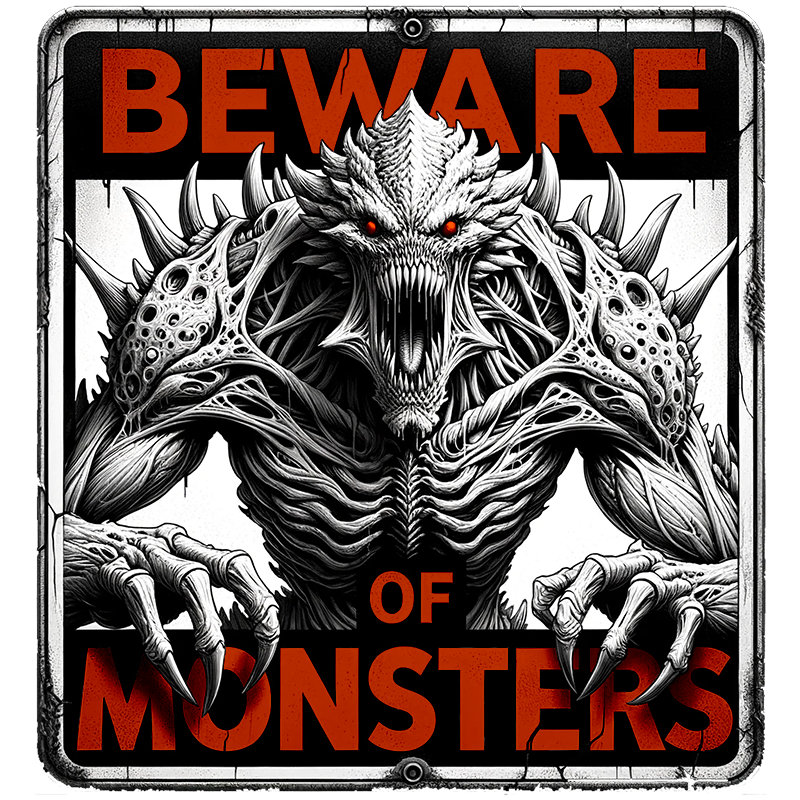

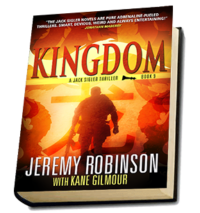
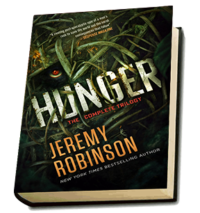
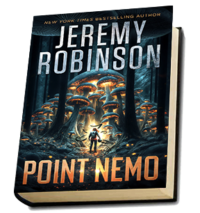
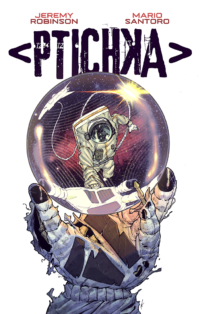
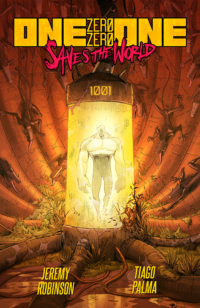
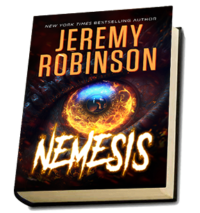
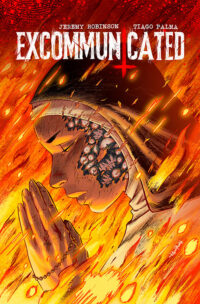
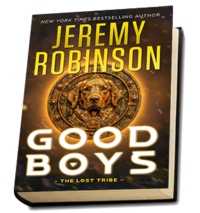
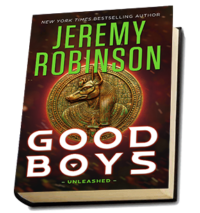
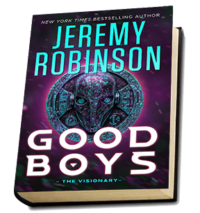
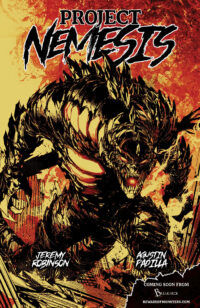
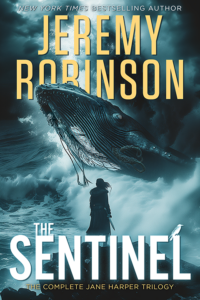
Recent Comments